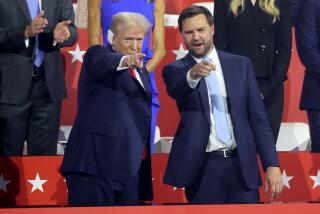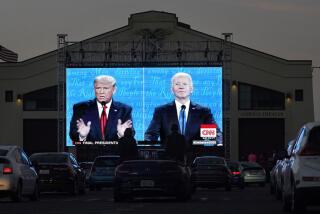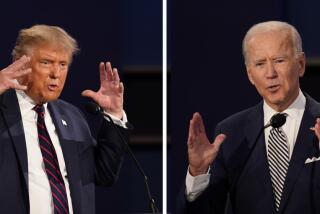Goldberg: Romney’s authenticity problem
- Share via
Mitt Romney is the most improbable of presidential candidates: a weak juggernaut. He is poised to sweep every primary contest — a first for a non-incumbent. And yet, in Republican ranks there’s an abiding sense that he should be beatable — and beaten.
It’s not that Romney doesn’t have fans. His events here in New Hampshire are packed to the rafters and feel like general election rallies. He’s surging in polls in South Carolina and Florida.
And yet the non-Mitt mood just won’t go away. Indeed, it’s intensifying. One reason is that people are starting to doubt whether he is in fact the best candidate to beat President Obama. For instance, you hear conservatives wondering more and more whether all of the attention from the White House is a head fake. Romney certainly makes a convenient foil for a presidential campaign already in populist overdrive.
I think that’s overdone. Romney has his faults, but he’s non-threatening. He seems more like the super-helpful manager at a rental car company than a Bible thumper. The White House would love the opportunity to run against a culture warrior. It seems many in the media would like the same thing. Hence the absurd grilling of the candidates in Saturday night’s ABC/Yahoo/WMUR-TV debate.
(For reasons that remain mysterious, the moderators wasted vast swaths of time quizzing the candidates on gay marriage, whether states could ban condoms and on how Rick Santorum would respond if one of his sons declared his homosexuality. Because as we all know, how the president would treat his hypothetically gay son is issue No. 1 for so many voters.)
Romney was at his best swatting away the swarm of inanities at the debate — “birth control is working just fine.” He’s weakest when discussing his own motives and career. Romney can sell ideas, and he can criticize Obama well. But he has a very hard time selling himself. When he talks about what he likes and what drives him, he reminds people that there’s just something off about him.
For instance, in Sunday’s “Meet the Press” debate, Romney suggested that he didn’t run for reelection as governor of Massachusetts because to have done so would have been vain or selfish somehow. “That would be about me.”
Newt Gingrich ridiculed that as “pious baloney.”
And he was right. Romney’s claim that he’s just a businessman called to serve — Cincinnatus laying down his PowerPoint — is nonsense. Romney, the son of a politician, has been running for office, holding office or thinking about running for office for more than two decades. “Just level with the American people,” Gingrich growled. “You’ve been running … at least since the 1990s.”
For some reason, Romney can’t do that. Or at least it seems like he can’t. His authentic inauthenticity problem isn’t going away. And it’s sapping enthusiasm from the rank and file. The turnout in Iowa was disastrously low, barely higher than the turnout in 2008 — and if Ron Paul hadn’t brought thousands of non-Republicans to the caucus sites, it would have been decidedly lower than in 2008. That’s an ominous sign given how much enthusiasm there should be for making Obama a one-term president. It’s almost as if Romney’s banality is infectious.
Santorum’s tie in Iowa is widely attributed to his diligent door-to-door campaigning. The Iowa political hacktocracy is deeply invested in the idea that the retail politicking in Iowa pays off. But it wasn’t paying off three weeks before the voting, when Santorum was in single digits. Gingrich’s erstwhile surge in the polls wasn’t a product of retail voting either. No, Santorum’s Iowa success was attributable almost entirely to Gingrich’s Newtacular implosion. Santorum was simply the last non-Romney standing who hadn’t been torn apart by the news media or Romney’s super PACs.
The most persuasive case for Romney has always been that if he’s the nominee, the election will be a referendum on Obama. But that calculation always assumed that rank-and-file Republicans would vote for their nominee in huge numbers no matter what. That may well still be the case, but it feels less guaranteed every day.
Every four years pundits and activists talk about how cool it would be to have a brokered convention (if no candidate has 50% of the delegates by convention time). This is the first time I’ve heard people saying it may be necessary.
jgoldberg@latimescolumnists.com
More to Read
A cure for the common opinion
Get thought-provoking perspectives with our weekly newsletter.
You may occasionally receive promotional content from the Los Angeles Times.










